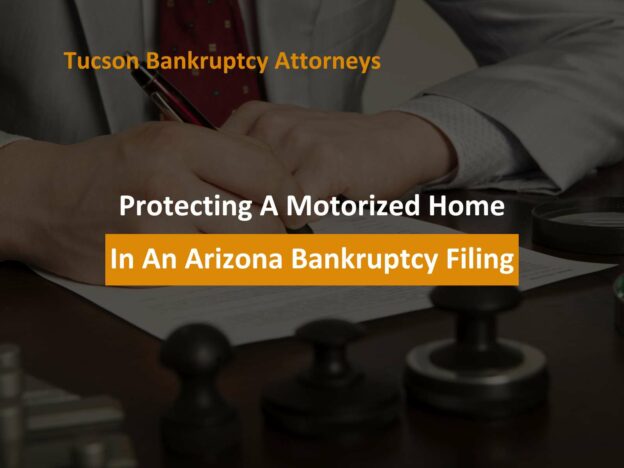For many people, living in a motorized home is a more ideal lifestyle than living in a house or an apartment. They provide a unique combination of affordability, flexibility, and community. They are just as important to protect in a bankruptcy filing as any other type of home. In bankruptcy, only assets that fall within a state’s bankruptcy exemptions are protected. Unprotected assets may be taken away by the bankruptcy trustee and sold, with the proceeds being used to pay creditors and a fee for the trustee. Each bankruptcy exemption has a specific purpose, and the exemption used to protect a bankruptcy debtor’s home is known as the homestead exemption.
Typically, the homestead exemption can be used on a wide variety of types of homes, including houses, condominiums, townhouses, and more. However, there is one famous bankruptcy case that many believe the court got wrong when it comes to what should be included in the homestead exemption. In the case In re: Drummond, the United States Bankruptcy Court for the District of Arizona ruled that the Drummond family’s “motor home” did not qualify as a “mobile home” that could be protected by Arizona’s bankruptcy exemptions. Read on to learn more about this case and its implications for motorized homes in Phoenix and Tucson bankruptcy cases. To schedule your free consultation with our Phoenix and Tucson Zero Down Bankruptcy Lawyers, call 520-307-0020.

In re: Drummond
This is an Arizona bankruptcy case ruling that the court issued on February 24, 2024. In this case, the Honorable Paul Sala ruled that a motor home does not qualify as a mobile home for the purposes of Arizona’s homestead exemption, A.R.S. § 33-1101(A)(3). The Drummonds lived in their 2017 Tiffin Allegro full-time when they filed for bankruptcy. Arizona’s homestead exemption clearly protects mobile homes, but the question was whether a motor home qualified as a mobile home. The trustee objected to them using this exemption. The court ruled that the motor home did not qualify because it is not intended to be permanent like a mobile home is- while they can be moved and altered, it is highly difficult and many mobile home residents never utilize this function. The real property, or land, attached to a home is what makes it a homestead. When moving a home to a different location is as easy as turning a key in the ignition, it loses a permanent interest in real property. The court also posited that mobile homes and condominiums are both inherently tied to the location on which they were constructed. Therefore, a motor home without a significant connection to the land on which it is parked does not qualify for the motor home homestead exemption in an Arizona bankruptcy filing.
Arizona Revised Statutes Section 13-1101
You can find Arizona’s homestead exemption in A.R.S. § 13-1101. A person over the age of 18 years old, married or unmarried, can protect up to $250,000 equity in an Arizona bankruptcy filing due to the homestead exemption. The four types of homesteads listed in this statute are:
- The person’s interest in real property in one compact body on which exists a dwelling house in which the person resides;
- The person’s interest in one condominium or cooperative in which the person resides;
- A mobile home in which the person resides; and
- A mobile home in which the person resides plus the land on which the mobile home is located.
A married couple can only use the homestead exemption once- for example, if a married couple owns a condominium and a house, the wife can’t claim the house and the husband claim the condominium under the homestead exemption. If the spouses are getting divorced, they should consider waiting until after the divorce has been finalized so that they can utilize two separate homestead exemptions.
The good news for someone who has recently sold their home is that the homestead exemptions can be used to protect the proceeds from a home sale in bankruptcy. The homestead exemption can be used to protect proceeds from a voluntary or involuntary home sale. This remains in effect for 18 months from the date of the sale or until the person establishes a new homestead with the proceeds. This feature can’t be used to protect the proceeds from re-financing a home.
Other Bankruptcy Exemptions In Arizona
Arizona’s bankruptcy exemptions provide protection from creditors for more assets than just the debtor’s homestead. Some of Arizona’s most commonly used bankruptcy exemptions include:
- Household goods and furnishings: This category includes household appliances and consumer electronic devices. The household goods and furnishings exemption protects up to $15,000 combined value.
- Motor vehicle: Up to $15,000 equity, and this exemption can be doubled and applied to two vehicles for a married couple. If the debtor or one of the debtor’s dependents has a physical disability, this exemption increases to $25,000.
- Wearing apparel: In the bankruptcy world, clothing is sometimes called “wearing apparel.” The exemption for clothing is $500, which can be doubled to apply to $1,000 worth of clothing for married couples.
- Bank account: The exemption for bank accounts in Arizona is only enough to cover some basic necessities with the current cost of living. Arizona’s exemption protects $300 for an individual debtor’s bank account and $600 for married couples. If the debtor expects to receive a paycheck around their filing date, they can protect up to 75% of earned but not yet received wages through a separate exemption. If possible, the debtor should time their filing to be after their wages have been received and spent on reasonable expenses.
- Life insurance proceeds: Life insurance proceeds after the passing of a spouse or parent are exempt up to $20,000 in Arizona.
- Food, fuel & provisions: Arizona’s exemption protects six months’ worth of food, fuel, and provisions. This can be subjective and depends on how large the debtor’s family is. This can also be a good opportunity for a debtor to spend funds that won’t be protected in bankruptcy- for example, the debtor can stock up on toilet paper, non-perishable food items, and more. A debtor attempting this strategy should not purchase gift cards, even to grocery stores and gas stations, because they are treated like cash in bankruptcy.
Arizona Zero Down Bankruptcy Lawyers Serving Phoenix & Tucson
Arizona Zero Down Bankruptcy is a payment plan option that our lawyers offer to help our clients afford their filing costs. Most firms require that all of their attorney’s fees, plus the bankruptcy filing fee, be paid in full before they will file their client’s case. This creates an issue because the debtor can’t stop debt collection actions such as a wage garnishment until the case has been filed. Our payment plan options allow you to pay for your case in affordable, interest-free installments after your petition has been filed. If you are looking to declare bankruptcy in Phoenix or Tucson, Arizona, we hope to be the first item on your checklist- our skilled Zero Down bankruptcy lawyers offer consultations by phone, free of charge. Learn more about the bankruptcy process without risk or obligation. When you’re ready to schedule your free consultation on the path towards bankruptcy and a fresh start, call 520-307-0020. Contact us at Tucson Bankruptcy Attorneys
TUCSON BANKRUPTCY ATTORNEYS
2 East Congress Street, Suite #900-6A
Tucson, AZ 85701
Office: (520) 307-0020
Website: https://tucsonbankruptcyattorney.co/

